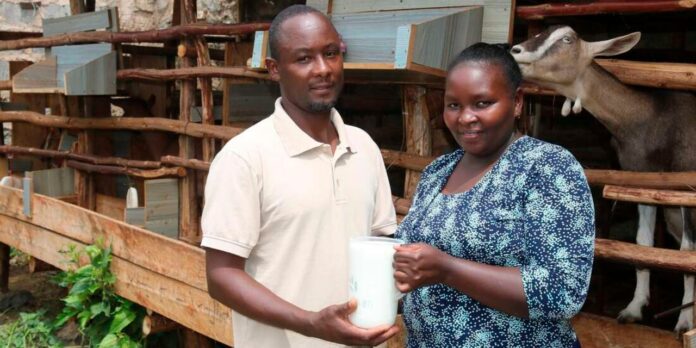Moses Mwaniki and his wife Rose Nyawira are engaged in dairy goat farming on their farm located in Juja, Kiambu County.
Mwaniki found the inspiration to enter the dairy business in 2017 after witnessing his mother’s successful project during a visit to her in Embu.
Mwaniki was impressed by his mother’s success with just three goats, which provided enough dairy milk for her household. This inspired him and he chose to follow in his mother’s footsteps.
In 2018, the 47-year-old embarked on his own dairy goat farming project at his home in Juja, Kiambu County. Despite his background in electrical engineering, his passion for dairy goat farming led him to start his agricultural venture.
He holds a diploma in electrical engineering and has previously worked with both local and foreign companies in countries such as Afghanistan and Iraq. Using his savings from his profession as a technician, he set up the necessary structures on a 30 by 60 plot.
“I bought two German Alpines does, which were producing milk, one going for Sh. 15,000 and the other for Sh. 13,000,” he noted.
By 2021, three years into dairy goat farming, Mwaniki received advice from friends and neighbours in his local community who suggested that he should transition to a commercial enterprise.
“From the inquiries I received from locals, I realised goat milk is popular. Most parents go for it because it helps guard against malnutrition in children,” he said in a past interview.
In mid-2022, Mwaniki’s goat herd had expanded to a total of 17 goats, and out of these, seven were actively producing milk.
How to fatten your beef cattle for quick profit
Mwaniki’s dairy goats are capable of producing approximately 2 to 3 litres of milk per day. His herd includes various breeds, such as German Alpine, crossbreeds of German Alpine and Toggenburg and crossbreeds of German Alpine and Saanen.
In response to the rising cost of animal feeds, Mwaniki has taken a self-sustaining approach to feeding his dairy goat herd. He provides his herd with a diet that includes hay, Napier grass, beans and maize stalks.
“I grow the fodder on a ¼ acre and a 60 by 30 feet piece of land.”
Additionally, he formulates his own concentrates by using a combination of ingredients that include maize, soya beans, sunflower, groundnuts, sorghum, and minerals.
“I buy ready-made materials and make the feed manually. I mix them in the following percentages to formulate a 100-kilo bag: Maize germ (43), wheat pollard (16), wheat bran (26), sunflower (5.5), cotton seed (6.75), animal feed lime (0.5), Magadi (1), DCP mineral (1) and premix (0.25).”








